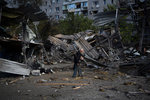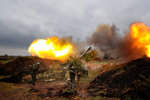

KYIV, Ukraine (AP) — Russian forces showered Ukraine with more missiles and munition-carrying drones Tuesday after widespread strikes killed at least 19 people in an attack the U.N. human rights office described as “particularly shocking” and amounting to potential war crimes.
Air raid warnings sounded throughout Ukraine for a second straight morning as officials advised residents to conserve energy and stock up on water. The strikes have knocked out power across the country and pierced the relative calm that had returned to Kyiv and many other cities far from the war's front lines.
“It brings anger, not fear,” Kyiv resident Volodymyr Vasylenko, 67, said as crews worked to restore traffic lights and clear debris from the capital's streets. “We already got used to this. And we will keep fighting.”
The leaders of the Group of Seven industrial powers condemned the bombardment and said they would “stand firmly with Ukraine for as long as it takes.” Their pledge defied Russian warnings that Western assistance would prolong the war and the pain of Ukraine's people.
Russia launched the widespread attacks in retaliation for a weekend explosion that damaged the Kerch Bridge between Russia and the Crimean Peninsula, which Moscow annexed in 2014. Russian President Vladimir Putin alleged that Ukrainian special services masterminded the blast. The Ukrainian government has applauded it but not claimed responsibility.
Ukrainian President Volodymyr Zelenskyy told the G-7 leaders during a virtual meeting that during the past two days Russia fired more than 100 missiles and dozens of drones at Ukraine, and that while Ukraine shot down many of them, it needs “more modern and effective” air defense systems.
The Pentagon earlier announced plans to deliver the first two advanced NASAM anti-aircraft systems to Ukraine in the coming weeks. The systems, which Kyiv has long wanted, will provide medium- to long-range defense against missile attacks.
Zelenskyy also urged the G-7 leaders to respond “symmetrically” to the attacks on the Ukrainian energy sector by doing more to stop Russia from profiting off its exports of oil and gas.
“Such steps can bring peace closer,” he said. “They will encourage the terrorist state to think about peace, about the unprofitability of war.”
Ukrainian officials said the strikes on power plants and civilian areas made no “practical military sense.” However, Putin’s supporters had urged the Kremlin for weeks to take tougher action in Ukraine and criticized the Russian military for a series of embarrassing battlefield setbacks.
Like Monday's strikes, the bombardment Tuesday struck both energy infrastructure and civilian areas. One person was killed when 12 missiles slammed into the southern city of Zaporizhzhia, setting off a large fire, the State Emergency Service said. A local official said the missiles hit a school, residential buildings, and medical facilities.
Energy facilities in the western Lviv and Vinnytsia regions also took hits. Officials said Ukrainian forces shot down an inbound Russian missile before it reached Kyiv, but the capital region experienced rolling power outages as a result of the previous day's strikes.
The State Emergency Service said 19 people died and 105 people were wounded in Monday’s strikes. At least five of the victims were in Kyiv, Mayor Vitali Klitschko said. More than 300 cities and towns lost power.
A spokesperson for the office of the U.N. High Commissioner for Human Rights said Tuesday that strikes on “civilian objects,” including infrastructure such as power plants, could qualify as a war crime.
“Damage to key power stations and lines ahead of the upcoming winter raises further concerns for the protection of civilians and in particular the impact on vulnerable populations,” Ravina Shamdasani told reporters in Geneva. “Attacks targeting civilians and objects indispensable to the survival of civilians are prohibited under international humanitarian law.”
War crimes investigations have long been underway in towns where mass graves were found, along with other evidence of atrocities, after they were liberated from Russian occupation. In Lyman, a city in the eastern Donetsk region, forensic workers pulled several bodies from a mass grave Tuesday, part of an arduous effort to piece together evidence of what happened under more than four months of Russian occupation. Regional Gov. Pavlo Kyrylenko said the bodies of 32 Ukrainian soldiers have been exhumed so far from one mass grave.
G-7 leaders who held the emergency meeting in response to Monday's attacks, said the “indiscriminate attacks on innocent civilian populations constitute a war crime” and reaffirmed their “commitment to providing the support Ukraine needs to uphold its sovereignty and territorial integrity.”
The pledge appeared to come in response to Kremlin warnings that Western military assistance, including training Ukrainian soldiers in NATO countries and feeding real-time satellite data to target Russian forces, increasingly made Ukraine's allies parties to the conflict.